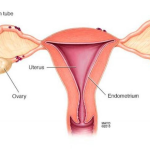That phrase usually comes from your instructor at the gym, right? But what can be gained by going through intense abdominal pain? Your healthcare practitioner views that pain as an urgent message from your body telling you something is up. Unfortunately, pelvic pain is not uncommon and there are several possible culprits, such as uterine fibroids and endometriosis.
Getting to the source is the most important step for finding relief. In a recent blog, we discussed endometriosis, an often-misdiagnosed cause of heavy, painful periods. Endometriosis can be harder to diagnose because the condition doesn’t show up in an ultrasound. However, uterine fibroids, which can also cause longer and more painful periods, do appear in ultrasounds and are therefore easier to diagnose and treat.
Fibroids, common in women between 30-40, are non-cancerous growths that develop in the muscular tissue of your uterus. We don’t know exactly how and why they form but can identify some risk factors: Black women are more likely to have fibroids than other racial groups, and if your mother or sister had fibroids, you’re at a higher risk.
If you’ve taken the most important step toward relief, then you’re planning to see your healthcare practitioner! To identify the source of your discomfort, we’ll conduct a pelvic exam. If your provider needs more information, she may recommend ultrasound, X-ray or hysteroscopy. Confirming the diagnosis of fibroids and knowing how many and of what size will help determine the plan of attack to provide you some relief.
We will treat the symptoms first and foremost. Effective pain medication and an iron supplement, if you’re anemic from heavy periods, are a good place to start. Medicines to control your hormones can shrink fibroids and others can treat heavy menstrual bleeding. A hormone-releasing IUD may also help control bleeding. For women who wish to become pregnant, minimally invasive surgery can remove fibroids and leave the uterus in place.
Fibroids may come and go, grow and shrink, throughout your life, so you will want your healthcare provider keep a close eye on you. The team at Women’s Healthcare of Princeton are experienced in identifying the causes of abdominal pain and offering solutions that fit into your reproductive life. Don’t ignore the messages your body is sending; you have a pain-free life to gain. Make an appointment with an expert and together we can improve your quality of life.


